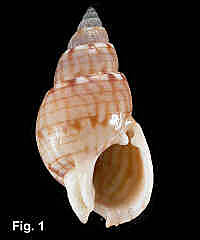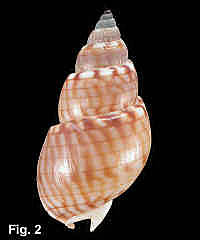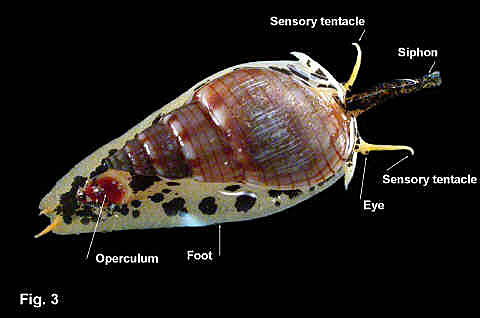

|
Nassarius
glans particeps
(Hedley, 1915)
Description:
Shell moderately light weight, of about six whorls and a protoconch of 1
1/2 - 1 3/4 whorls. Whorls rounded, with a ledge below the suture; early
spire whorls with axial ribs and spiral grooves, last two whorls smooth.
Outer lip with 3-4 very small denticles anteriorly. Anal canal
pronounced. Columella smooth apart from single fold at base and strong
parietal denticle at upper end. White to cream in colour, ornamented
with thin, crisp spiral brown lines, about 6-8 on the body whorl, plus
2-3 spiral rows of indistinct brown spots on the body whorl. Columella
and outer lip white.
Size:
Length up to 32 mm, commonly about 25 mm.
Distribution:
The subspecies is endemic to Australia; Proserpine, Qld, to Port
Hedland, WA, excluding Tas.
Habitat:
In sand pockets on rocky shores, from low intertidal down to 77 m. The
animal is coloured cream with black spots, and is very active. Common.
Remarks:
This subspecies is the southern Australian temperate water form of the
tropical Indo-West Pacific Nassarius glans (Linnaeus, 1758). The
tropical subspecies is larger in size, more solid and elongate, with a
more shining texture and usually nodulose sutures, but without the
violet colour. At the western and eastern ends of the range of N.
glans particeps (i.e. Exmouth Gulf, WA and Proserpine, Qld) the two
subspecies are sympatric with hybrids occasionally occurring
(Cernohorsky, 1981).
Figs.
1,2: Fingal Bay, NSW (DLB4961)
Fig.
3: Bottle and Glass Rocks, Sydney Harbour, NSW (DLB5045)

|